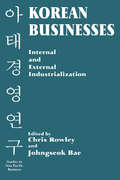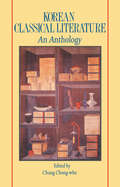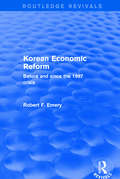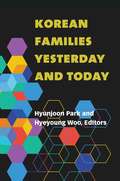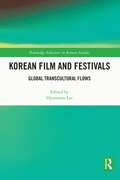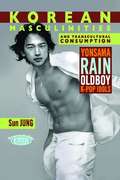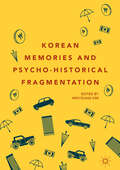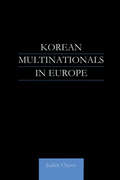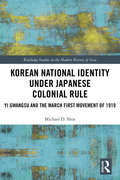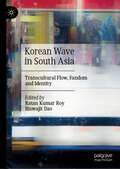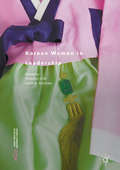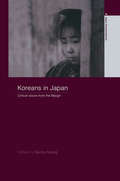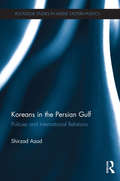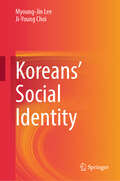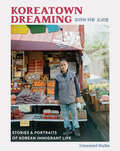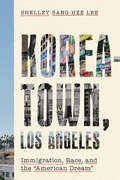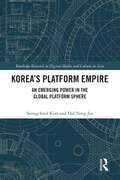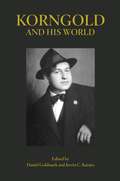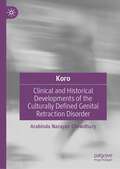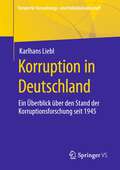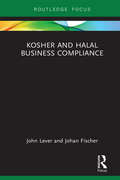- Table View
- List View
Korean Beauty Secrets: A Practical Guide to Cutting-Edge Skincare & Makeup
by Kerry Thompson Coco ParkBeauty tips and tricks from the salons of South Korea
Korean Businesses: Internal and External Industrialization (Studies In Asia Pacific Business)
by CHRIS ROWLEY; JOHNGSEOK BAEEssays in the book focus on the Korean model of industrialization and internal internationalization, organizational capabilities and management roles, and disadvantages inherent in the model. The subjects covered include corporate catch-up strategies, foreign investment, and future possibilities.
Korean Classical Literature
by Chung Chong-WhaFirst published in 1989. This is a collection of essays, excerpts of Korean classical literature including areas of romance, and selected work of Park Jiwon. Samsolgi is a collection of nine allegorical stories in three volumes, and works to stimulate the imagination.
Korean Economic Reform: Before and Since the 1997 Crisis (Routledge Revivals Ser.)
by Robert F. EmeryThis title was first published in 2001. In 1997 the author was told, by an official at the Korean embassy in Washington DC, that the most serious economic problem facing Korea was the need for reform of the financial sector. This proved to be true, as a financial crisis hit Korea in November 1997. Though problems arising before November 1997 indicate that Korea's economic problems were not solely financial. This study covers earlier reform efforts, the 1997 crisis and the measures taken by Korea since then to deal with the country's economic problems. It attempts to analyze the problems and offer suggestions as to how problems might corrected or resolved.
Korean Families Yesterday and Today (Perspectives On Contemporary Korea)
by Hyunjoon Park Hyeyoung WooKorean families have changed significantly during the last few decades in their composition, structure, attitudes, and function. Delayed and forgone marriage, fertility decline, and rising divorce rates are just a few examples of changes that Korean families have experienced at a rapid pace, more dramatic than in many other contemporary societies. Moreover, the increase of marriages between Korean men and foreign women has further diversified Korean families. Yet traditional norms and attitudes toward gender and family continue to shape Korean men and women’s family behaviors. Korean Families Yesterday and Today portrays diverse aspects of the contemporary Korean families and, by explicitly or implicitly situating contemporary families within a comparative historical perspective, reveal how the past of Korean families evolved into their current shapes. While the study of families can be approached in many different angles, our lens focuses on families with children or young adults who are about to forge family through marriage and other means. This focus reflects that delayed marriage and declined fertility are two sweeping demographic trends in Korea, affecting family formation. Moreover, “intensive” parenting has characterized Korean young parents and therefore, examining change and persistence in parenting provides important clues for family change in Korea. This volume should be of interest not only to readers who are interested in Korea but also to those who want to understand broad family changes in East Asia in comparative perspective.
Korean Film and Festivals: Global Transcultural Flows (Routledge Advances in Korean Studies)
by Hyunseon LeeThis book examines the various film festivals where Korean cinema plays a significant role, both inside and outside of Korea, focusing on their history, structure and function, and analysis of successful festival films. Using Korean film festivals and Korean cinema at international film festivals as its primary lens, this interdisciplinary volume explores the shifting relationships between the multi-media genre of film and the fast-growing changing world of film festival cultures. It examines the changing aesthetics of Korean film in a transcultural context and historical (dis)continuity from a variety of angles from film and media studies, literary and cultural studies, Korean studies, Japanese studies, and also from film festival practice. Moreover, through comprehensive examinations of both domestic and international film festivals from the perspectives of production, distribution and marketing it highlights the reception of Korean cinema outside of Korea in an increasingly globalised industry. Featuring the contributions of expert scholars of international film and Korean cinema, in addition to interview material with a practicing film professional, this book will be of huge interest to students and scholars of Korean and Asian film and media studies, as well as those interested in the impact of film festivals more generally.
Korean Immigrants in Canada
by Samuel Noh Marianne Noh Ann KimKoreans are one of the fastest-growing visible minority groups in Canada today. However, very few studies of their experiences in Canada or their paths of integration are available to public and academic communities. Korean Immigrants in Canada provides the first scholarly collection of papers on Korean immigrants and their offspring from interdisciplinary, social scientific perspectives.The contributors explore the historical, psychological, social, and economic dimensions of Korean migration, settlement, and integration across the country. A variety of important topics are covered, including the demographic profile of Korean-Canadians, immigrant entrepreneurship, mental health and stress, elder care, language maintenance, and the experiences of students and the second generation. Readers will find interconnecting themes and synthesized findings throughout the chapters. Most importantly, this collection serves as a platform for future research on Koreans in Canada.
Korean Masculinities and Transcultural Consumption
by Sun JungSouth Korean masculinities have enjoyed dramatically greater influence in recent years in many realms of pan-Asian popular culture, which travels freely in part because of its hybrid trans-nationalistic appeal. This book investigates transcultural consumption of three iconic figures - the middle-aged Japanese female fandom of actor Bae Yong-Joon, the Western online cult fandom of the thriller film 'Oldboy,' and the Singaporean fandom of the pop-star Rain. Through these three specific but hybrid contexts, the author develops the concepts of soft masculinity, as well as global and postmodern variants of masculine cultural impacts. In the concluding chapter, the author also discusses recently emerging versatile masculinity within the transcultural pop production paradigm represented by K-pop idol boy bands.
Korean Memories and Psycho-Historical Fragmentation
by Mikyoung KimThis pioneering book is the first English volume on Korean memories. In it, Mikyoung Kim introduces ‘psycho-historical fragmentation’, a concept that explains South Korea’s mnemonic rupture as a result of living under intense temporal, psychological and physical pressure. As Korean society has undergone transformation at unusual speed and intensity, so has its historical memory. Divided into three sections, on lingering colonial legacies, the residuals of the Cold War and Korean War, and Korea’s democracy movement in the 1980s, Korean Memories and Psycho-Historical Fragmentation aims to tell multi-layered, subtle and lesser-known stories of Korea’s historical past. With contributions from interdisciplinary perspectives, it reveals the fragmentation of Korean memory and the impact of silencing.
Korean Multinationals in Europe (Routledge Advances in Korean Studies)
by Judith CherryExplores Korean foreign direct investment, putting forward a theoretical framework to explain why the Korean conglomerates felt compelled to invest in western, central and eastern Europe.
Korean National Identity under Japanese Colonial Rule: Yi Gwangsu and the March First Movement of 1919 (Routledge Studies in the Modern History of Asia)
by Michael ShinModern Korean nationalism has been shaped by the turbulent historical forces that shook and transformed the peninsula during the twentieth century, including foreign occupation, civil war, and division. This book examines the emergence of the nation as the hegemonic form of collective identity after the March First Movement of 1919, widely seen as one of the major turning points of modern Korean history. The analysis focuses on Yi Gwangsu (1892–1950), a pioneering novelist, newspaper editor, and leader of the nationalist movement, who was directly involved in many aspects of its emergence during the Japanese occupation period. Yi Gwangsu was one of the few intellectuals who not only wrote for almost the entirety of the colonial period but who also was centrally involved in many institutions related to the production of identity. By focusing on Yi Gwangsu the book provides a different kind of historical narrative linking the various fragments of the nation, puts forward a new understanding of the March First Movement and its role in the emergence of the nation, and demonstrates how central to the emergence of the nation were the development of the print industry, the rise of a modern readership, and the emergence of a capitalist market for print. This book shows how the March First Movement catalyzed the confluence of these factors, enabling the nation to emerge as the dominant form of collective identity.
Korean Wave in South Asia: Transcultural Flow, Fandom and Identity
by Biswajit Das Ratan Kumar RoyThis book is a systematic investigation of Korean cultural wave in South Asia, discovering and analysing the dynamics of fandom, mechanism of media industry and growing phenomena of Korean culture in this part of the world. This is one of the very first academic volumes in South Asia that examines cultural politics, language and literatures of Korea in a regional location when there might be some on examining the political and diplomatic relations divorced from socio-cultural interactions. It focuses on three major aspects: identity formation in the age of digital culture, fandom and aspiration in the wake of subculture, and transcultural flow in South Asia. Through these thematic indicators and empirical instances the volume explores the modes of transcultural flow vis a via the global cultural flow. The patterns and processes of identity construction transformed among the teenagers and youths in the realm of digital media and embodying the Korean cultural elements. The book will contribute in the area of media and cultural studies, global culture and politics, arts and humanities, social sciences and area studies.Chapter 1 is available open access under a Creative Commons Attribution 4.0 International License via link.springer.com.
Korean Women Managers and Corporate Culture: Challenging Tradition, Choosing Empowerment, Creating Change (Routledge Studies in the Growth Economies of Asia)
by Jean R. RenshawThe typical view of Korean women is not as managers. The stereotype is of Korean women serving and pleasing men, or more recently as aggressive shopkeepers and bar-owners. Very little has been written to challenge this misconception. This fascinating book reveals there have always been managers amongst Korean women, particularly in occupations like money lending, retail and fashion, and women continue to serve after the economic crash at the beginning of a new century. Korean Women Managers and Corporate Culture illuminates the many roles of women - from management, leadership and policy making, to the more traditional positions as homemaker and wife – and describes the distinctive Korean corporate culture and economy in order to evaluate the future of women as well as that of Korea itself.
Korean Women in Leadership (Current Perspectives on Asian Women in Leadership)
by Yonjoo Cho Gary N. McLeanThe book focuses on the historical, political, economic, and cultural elements of Korea and the strong influence these have on women leaders in the nation. It examines challenges and opportunities for women leaders as they try to balance their professional and personal lives. A team of leading experts familiar with the aspirations and frustrations of Korean women offer insight into the coexistence of traditional and modern values. It is an eye-opening look at the convergence and divergence across Korean sectors that international leadership researchers, students, and managers need to know in order to realize and appreciate the potential of Korean women leaders.
Korean Workers and Neoliberal Globalization (Routledge Advances in Korean Studies #Vol. 11)
by Kevin GrayOne of the most remarkable aspects of South Korea’s transition from impoverished post-colonial nation to fully-fledged industrialized democracy has been the growth of its independent and dynamic labour movement. Korean Workers and Neoliberal Globalisation examines current trends and transformations within the Korean labour movement since the 1990s. It has been a common assumption that the ‘third wave’ of democratisation, the end of the Cold War, and the spread of neoliberal globalisation in the latter part of the 20th century have helped to create an environment in which organised labour is better placed to overcome bureaucratic national unionism and transform itself into a potential counter-globalisation movement. However, Kevin Gray argues that despite the apparent continued phenomena of labour militancy and the rhetoric of anti-neoliberalism, the mainstream independent labour movement in Korea has become increasingly institutionalised and bureaucratised into the new capitalist democracy. This process is demonstrated by the Korean Confederation of Trade Unions’ experience of participation in various forms of policy making forums. Gray suggests that as a result, the KCTU has failed to mount an effective challenge against processes of neoliberal restructuring and concomitant social polarisation. The Korean experience provides an excellent case study for understanding the relationship between organised labour and globalisation. Korean Workers and Neoliberal Globalisation will appeal to students and scholars of Korean studies and International Political Economy, as well as Asian politics and economics.
Koreans in Japan: Critical Voices from the Margin (Routledge Studies in Asia's Transformations)
by Sonia RyangKoreans in Japan are a barely known minority, not only in the West but also within Japan itself. This pioneering study analyzes these relations in the context of the particular conditions and constraints that Koreans face in Japanese society. The contributors cover a wide range of topics, including: * the legal and social status of Koreans in Japan * the history of Korean colonial displacement and postcolonial division during the Cold War * ethnic education * women's self-expression. These studies serve to reveal the highly resilient and diverse reality of this minority group, whilst simultaneously highlighting the fact that - despite recent improvement - legal, social and economic constraints continue to exist in their lives.
Koreans in the Persian Gulf: Policies and International Relations (Routledge Studies in Middle Eastern Politics)
by Shirzad AzadAnalyzing the Korean Peninsula's contemporary engagement with the Persian Gulf region from the 1950s to the present day, the book begins by asking the following question: What drew Koreans to the region in the first place and under what circumstances were they drawn there? While taking into account a combination of both external and internal factors shaping the dynamics of the Korean Peninsula's interactions with the Persian Gulf region, this book largely concentrates on the agency factor to analyze the nature and scope of a rather multifaceted relationship between the two areas. The Republic of Korea has, in fact, maintained diverse connections to every single country in the Persian Gulf over the past several decades, and its rather considerable activities and accomplishments in the region all justify such an overwhelming focus. The Democratic People's Republic of Korea's record in the Persian Gulf, however, is mostly limited to its relationship with Iran, though Pyongyang has pursued relationships with some other states in the region. This book studies the elements of Pyongyang's actions in the region as an appendage to South Korea's various political and economic achievements. Employing a process-tracing approach, this book will be of interest to policymakers, as well as to students and scholars of International Relations, Middle East Studies and Asian Studies.
Koreans' Social Identity
by Myoung-Jin Lee Ji-Young ChoiThis book examines the changing characteristics of Korean society and Koreans in various areas, including politics, economics, and society, providing rich analyses on social identity. Factoring in the trajectory of Korean history, the authors chart the rapid economic growth of Korea and the ways in which this has significantly improved Koreans' material living standards. The book shows that despite the Cold War and inter-Korean confrontation, active citizen participation has institutionalized democracy in Korea. A society once characterized by strong familial ties and patriarchal verticality has shifted to a more horizontal structure with diverse values. Transitions from agricultural to industrial and information societies have occurred within one or two generations. Rapid aging is another critical issue, with Korea experiencing one of the fastest aging trends globally. The shift toward a multicultural society challenges the traditional identity of Koreans based on a single ethnicity. Against this backdrop, this book seeks to capture the characteristics of changing Korean society and the people living in it, based on the concept of social identity that an individual's evaluation is not just a temporary personal feeling or prejudice but a cultural product. It allows for an objective analysis of a society or its cultural characteristics by measuring social identity. The first part of the book introduces the concept of social identity and presents analysis results in several fields. The second examines changes in the values and attitudes of representative Koreans. The third part discusses the social problems and tasks created by the changes in various values and attitudes. Finally, the last section explores concrete measures to overcome these problems and aim for social integration in future and emphasizes elements that enhance social trust and integration. It is relevant to sociologists and scholars working across various social science dimensions focused on Korea.
Koreatown Dreaming: Stories & Portraits of Korean Immigrant Life
by Emanuel HahnExplore and celebrate Korean culture in America through photographs and interviews by award-winning photographer Emanuel Hahn. "Photographer Hahn's animated and vivid debut . . . is exceptional." —Publisher's Weekly, Starred Review Since the first wave of Korean immigration in the early 1900s, Korean immigrants have opened and operated small businesses across the country that enrich the cultural fabric of our communities. Yet their stories are too often overlooked, as even today their existence is being pushed to the margins of American society. In Koreatown Dreaming, a project that began in Los Angeles and expanded to eight other cities, the lives of Korean immigrants are observed with care and admiration under Hahn's tender, capacious gaze. Hahn's arresting photographs and narrativized interviews portray Korean small business owners as key figures not just in their neighborhoods but in their own lives, where they experience personal struggle, sacrifice, triumph, growth, and joy.Koreatown Dreaming is at once an anecdotal history of Korean immigration and a touching homage to Korean immigrant life. These intimate stories of over 50 small businesses are a testament to the American Dream, even while complicating the illusions of that promise, and of what it means to be American. Cities featured: Los Angeles, California; Atlanta, Georgia; Annandale, Virginia; New York, New York; Flushing, New York; Pal Park, New Jersey; Fort Lee, New Jersey; Dallas, Texas; Honolulu, Hawaii.
Koreatown, Los Angeles: Immigration, Race, and the "American Dream" (Asian America)
by Shelley Sang-Hee LeeThe story of how one ethnic neighborhood came to signify a shared Korean American identity. At the turn of the twenty-first century, Los Angeles County's Korean population stood at about 186,000—the largest concentration of Koreans outside of Asia. Most of this growth took place following the passage of the Hart-Celler Act of 1965, which dramatically altered US immigration policy and ushered in a new era of mass immigration, particularly from Asia and Latin America. By the 1970s, Korean immigrants were seeking to turn the area around Olympic Boulevard near downtown Los Angeles into a full-fledged "Koreatown," and over the following decades, they continued to build a community in LA. As Korean immigrants seized the opportunity to purchase inexpensive commercial and residential property and transformed the area to serve their community's needs, other minority communities in nearby South LA—notably Black and Latino working-class communities—faced increasing segregation, urban poverty, and displacement. Beginning with the early development of LA's Koreatown and culminating with the 1992 Los Angeles riots and their aftermath, Shelley Sang-Hee Lee demonstrates how Korean Americans' lives were shaped by patterns of racial segregation and urban poverty, and legacies of anti-Asian racism and orientalism. Koreatown, Los Angeles tells the story of an American ethnic community often equated with socioeconomic achievement and assimilation, but whose experiences as racial minorities and immigrant outsiders illuminate key economic and cultural developments in the United States since 1965. Lee argues that building Koreatown was an urgent objective for Korean immigrants and US-born Koreans eager to carve out a spatial niche within Los Angeles to serve as an economic and social anchor for their growing community. More than a dot on a map, Koreatown holds profound emotional significance for Korean immigrants across the nation as a symbol of their shared bonds and place in American society.
Korea’s Platform Empire: An Emerging Power in the Global Platform Sphere (Routledge Research in Digital Media and Culture in Asia)
by Dal Yong Jin Seongcheol KimKorea’s Platform Empire explores the evolution of digital platforms in South Korea’s media sphere, and their global political, economic, cultural, and technological influence.With a focus on Korea in the context of the global platform revolution, the book takes a methodical look at the broader social implications and the impact on cultural production. The authors explore various facets of the media and cultural industries—looking beyond social media to news broadcasting and the music industry—and look at the policy and regulations behind this shifting technological advancement.This book will appeal to students and scholars working on media industries, digital media, platform studies, information and technology studies, Korean and East Asian media studies, and the creative and cultural industries.
Korngold and His World (The\bard Music Festival Ser. #45)
by Kevin C. Karnes Daniel GoldmarkA brand-new look at the life and music of renowned composer Erich Wolfgang KorngoldErich Wolfgang Korngold (1897–1957) was the last compositional prodigy to emerge from the Austro-German tradition of Mozart and Mendelssohn. He was lauded in his youth by everyone from Mahler to Puccini and his auspicious career in the early 1900s spanned chamber music, opera, and musical theater. Today, he is best known for his Hollywood film scores, composed between 1935 and 1947. From his prewar operas in Vienna to his pathbreaking contributions to American film, Korngold and His World provides a substantial reassessment of Korngold’s life and accomplishments.Korngold struggled to reconcile the musical language of his Viennese upbringing with American popular song and cinema, and was forced to adapt to a new life after wartime emigration to Hollywood. This collection examines Korngold’s operas and film scores, the critical reception of his music, and his place in the milieus of both the Old and New Worlds. The volume also features numerous historical documents—many previously unpublished and in first-ever English translations—including essays by the composer as well as memoirs by his wife, Luzi Korngold, and his father, the renowned music critic Julius Korngold.The contributors are Leon Botstein, David Brodbeck, Bryan Gilliam, Daniel Goldmark, Lily Hirsch, Kevin Karnes, Sherry Lee, Neil Lerner, Sadie Menicanin, Ben Winters, Amy Wlodarski, and Charles Youmans.Bard Music Festival 2019Korngold and His WorldBard CollegeAugust 9–11 and 16–18, 2019
Koro: Clinical and Historical Developments of the Culturally Defined Genital Retraction Disorder
by Arabinda Narayan ChowdhuryThis book provides a definitive account of koro, a topic of long-standing interest in the field of cultural psychiatry in which the patient displays a fear of the genitals shrinking and retracting. Written by Professor A.N. Chowdhury, a leading expert in the field, it provides a comprehensive overview of the cultural, historical and clinical significance of the condition that includes both cutting-edge critique and an analysis of research and accounts from the previous 120 years published literature. The book begins by outlining the definition, etymology of the term, and clinical features of koro as a culture-bound syndrome, and contextualizes the concept with reference to its historical origins and local experience in Southeast Asia, and its subsequent widespread occurrence in South Asia. It also critically examines the concept of culture-bound disorder and the development of the terminology, such as cultural concepts of distress, which is the term that is currently used in the DSM-5. Subsequent chapters elaborate the cultural context of koro in Chinese and South Asian cultures, including cultural symbolic analysis of associations with animals (fox and turtle) and phallic imagery based on troubling self-perceived aspects of body image that is central to the concept. The second section of the book offers a comprehensive, global literature review, before addressing the current status and relevance of koro, clinically relevant questions of risk assessment and forensic issues, and research methodology.This landmark work will provide a unique resource for clinicians and researchers working in cultural psychiatry, cultural psychology, anthropology, medical sociology, social work and psychosexual medicine.
Korruption in Deutschland: Ein Überblick über den Stand der Korruptionsforschung seit 1945 (Forum für Verwaltungs‐ und Polizeiwissenschaft)
by Karlhans LieblDas Buch führt die wichtigsten Strömungen der Korruptionsforschung seit 1945 auf. Ein besonderes Augenmerk wird dabei auf die deutsche Forschungslandschaft gelegt. Weitere Schwerpunkte sind die Untersuchungen zum Umfang der Korruption, methdoische Probleme der Erhebung von Daten zur Korruption und Präventionsvorschläge. Letzterer Gesichtspunkt hat wieder einen besonderen Blick auf Deutschland. Abschließend werden die bisherigen Forschungen bewertet und Forderungen für zukünftige Untersuchungen dargelegt.
Kosher and Halal Business Compliance
by Johan Fischer John LeverKosher is a Hebrew term meaning ‘fit’ or ‘proper’ and halal is an Arabic word that literally means ‘permissible’ or ‘lawful’. Within the last two decades or so, kosher and halal markets have become global in scope and states, manufacturers, restaurants, shops, certifiers and consumers around the world are faced with ever stricter and more complex requirements – most clearly exemplified by Muslim and Jewish groups’ call for kosher and halal certification by third party certification bodies. During this period hundreds of kosher and halal certifiers have emerged around the world, and while thousands of manufacturers, restaurants and shops have been certified, the majority have not. Kosher and halal requirements are comparable, but there are also many differences and the book discusses how these similarities and differences affect production, trade and regulation around the world. The authors research demonstrates that there is a need to address kosher and halal markets simultaneously and answers the question "what characterizes global kosher and halal markets and how can businesses comply with the rising demands and requirements that have emerged?" This is the only book of its kind and it will appeal to manufacturing companies, restaurants and shops that already are or want to be kosher/halal certified. The book can also be assigned in a variety of upper-level undergraduate courses and graduate seminars in business studies, management and marketing. Moreover, the book will be of interest to readers in the natural sciences (for example, food scientists) and outside academia, that is, to state as well as non-state kosher/halal certification bodies, policy makers, interest groups and consultants. Kosher and Halal Business Compliance is accessible in style, global in scope and based on decades of research.

